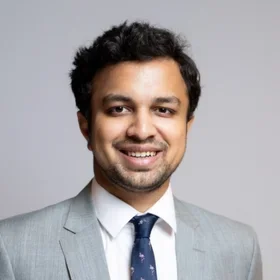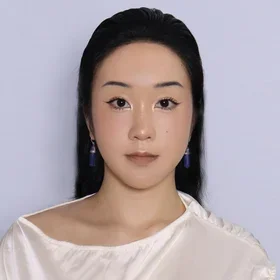Completing graduate school is no easy feat, and the incline is even steeper for first-generation students. Azida Ahmad Azmi, a new graduate of the M.S. in Negotiation and Conflict Resolution (NECR) program at the Columbia University School of Professional Studies (SPS)—and the first in her family to complete secondary education, let alone earn a master’s degree—was honored this month as the student winner of the 2025 Dean’s Excellence Award.
At a recognition ceremony for the Student Excellence Awards, SPS dean Troy Eggers announced Azmi’s selection for the prize, highlighting her commitment to educational equity and noting her strong engagement with the School. In addition to her academic achievement, Azmi served as president of the Association for Negotiation and Conflict Resolution, was a recipient of the SPS Academic and Professional Grant, and worked as an intern in the Office of Admissions. In the words of one of her nominators for the prize, Eggers said, “She challenges assumptions, asks difficult questions, and seeks knowledge from beyond institutional walls.”
We spoke to Azida Azmi about her efforts to help others like her access educational opportunities and how her studies at SPS in Negotiation and Conflict Resolution fit into that picture.
How do you feel about receiving this award and completing your master’s at Columbia, particularly as the first person in your family to receive a higher degree?
Truthfully, it still hasn’t set in that I am where I am today. From my mother’s side of the family, no one had ever obtained a “high school diploma or equivalent” successfully, making me the first to ever do so. I grew up thinking I would repeat the fate of my mother—an immigrant who had to abandon her dreams of an education—like all the people before her, to work multiple jobs a day just to make a living.
As a first-generation student, there is so much grief with being here. It’s the grief of knowing that my ability to dream this big was made possible by people who never had the luxury to dream for themselves. In many ways, I feel like I’m living the life my mother could have had. Every step forward feels like I am walking not just for myself but for my mother, for my grandparents, and for all those whose names will never be on a diploma but whose sacrifices built the foundation I stand on.
Can you tell us a bit about your journey to the Negotiation and Conflict Resolution program at SPS? What led you to pursue this degree in particular?
Throughout my undergraduate studies in Malaysia, I was actively involved in nonprofit work ranging from humanitarian missions to youth development programs. A recurring pattern I observed, no matter what I did, was how education—which is often marketed as the vehicle for social mobility—was often reinforcing inequalities. I witnessed many youths being shut out of educational opportunities, not because they lacked potential but because of what their families could afford. I was incredibly frustrated with how the education system was not serving the very communities it claimed to uplift. What troubled me even more was how these injustices were routinely dismissed or overlooked. People often assumed that because there was no visible violence, there was no conflict.
That is why I decided to pursue an M.S. in Negotiation and Conflict Resolution. I wanted to better understand the complexity of these systemic issues and to be equipped with the courage and language to hold space for the kinds of difficult conversations most systems avoid.
What was most memorable about your experience at Columbia and within the NECR program specifically?
The most memorable and enriching experience I had at Columbia was attending the N-Conference [the Negotiation Conference] in Zurich alongside Dr. Beth Fisher-Yoshida. Being in a room with global conflict practitioners, negotiators, and scholars challenged me to think beyond the classroom and to situate my work within a broader international context. For the first time, I saw how my voice, shaped by the realities of a postcolonial education system and grounded in community work, could offer something distinct in global conversations on conflict resolution.
Can you speak about your work on educational equality? What are your priorities within this advocacy work, and what are your career goals more generally?
In 2024, I founded Ezzy’s Consulting Service, which is a free mentorship program aimed at dismantling the barriers that prevent students from underserved backgrounds from accessing educational opportunities. In just one year, I’ve mentored more than 400 students, most from low- and middle-income families across Malaysia. Some have gone on to win competitive scholarships, pursue degrees at institutions like Columbia, Harvard, and UCL, or participate in programs such as the YSEALI Fellowship, funded by the U.S. Department of State. My initiative strives to foster the belief that underserved students have as much right to ambition as anyone else.
My priority is to increase the distribution of educational opportunities to students from lower-income backgrounds in Malaysia. At the core of my work is a refusal to accept that inequality is inevitable. This means advocating for a holistic admissions framework that accounts for a student’s starting point. It means fighting for transparency in how scholarships are distributed and pushing institutions to stop hiding behind the language of neutrality when their systems disproportionately reward those who were already ahead.
I also believe in shifting the narrative around educational success. We should uplift not only the student who gets straight A’s on national exams but also the student who, despite failing one subject, worked three jobs to support their family and still showed up to class, the student who found their voice through community activism instead of academic achievement. These are not deficits. They are different forms of excellence—ones that our current systems are unequipped to recognize. I am not interested in helping a few students beat the odds; I want to change the odds altogether.
About the Program
Columbia University’s Master of Science in Negotiation and Conflict Resolution prepares students to analyze the root causes and dynamics of conflict and to transform disputes through reasoned and resourceful interventions. The program focuses on developing self-awareness, tenacity, and interpersonal competency; building common ground; opening lines of communication; ensuring representation and recognition, and building sustainable possibilities for resolution.
The program has on-campus and online (with residency) modality options. Learn more about the M.S. in Negotiation and Conflict Resolution program here.


